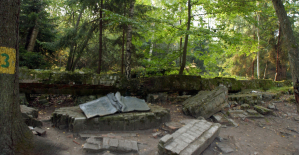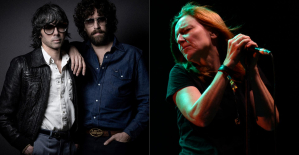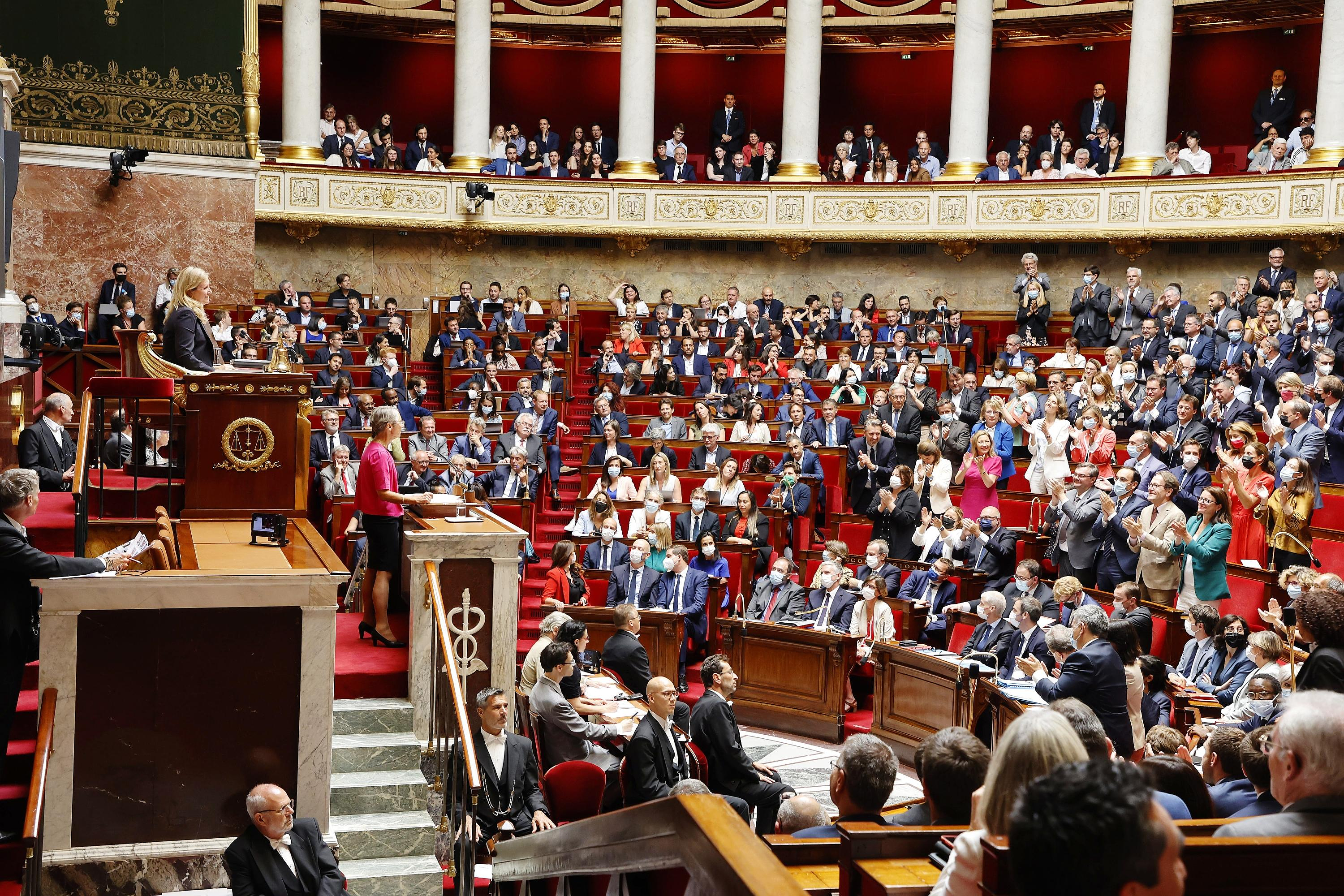The American poet Louise Glück died this Friday, October 13, at her home in Cambridge, Massachusetts. She was 80 years old. Little known to the general public, celebrated in academic circles, she was crowned with the Nobel Prize for Literature in 2020.
In their press release, the members of the Royal Swedish Academy commented on their choice: “His works are characterized by a concern for clarity. Childhood and family life, the close relationship with parents and brothers and sisters, are a theme that remained central to her.” A choice all the more surprising as it excluded other recognized American poets, other great voices such as those of Bernadette Mayer, Grace Schulman, Charles Simic (who left us last January) and even Ron Padgett (celebrated in Jim Jarmusch's film Paterson). Born in 1943 in New York, raised on Long Island, this girl from a Jewish family of Hungarian and Russian origin, Louise Glück (pronounced “Glick”) had published around fifteen collections and a few volumes of essays.
In 1993, she won the Pulitzer Prize for poetry for her collection Wild Iris, published the previous year, and the National Book Award in 2014, for Faithful and Virtuous Night, which opens with these verses: “First stripping ourselves of the goods of this world, as St. Francis teaches / so that our souls are not distracted / by gain and loss.” If it is very difficult to define her poetry, its tones and its colors, Louise Glück admitted to being “attracted by the ellipsis, the unsaid, the suggestive, the eloquent, voluntary silence”. She felt close to poets such as Rilke, Wallace Stevens, Yeats, and T. S. Eliot. Since his Nobel Prize, his work has been widely translated, notably in France, by Gallimard, with four collections now available in French.
Author of a first book in 1968, Firstbone, influenced by Sylvia Plath and Robert Lowell, it was finally with his sixth collection, published in 1992, that Glück reached maturity and consecration, after having abandoned a certain hermetic austerity: The Wild Iris, published two years after Ararat. A collection considered today as a classic of late 20th century poetry, in the same way as The World Doesn't End by Charles Simic. The Wild Iris can be read as the metaphor of the garden seen as a lost paradise, a sort of book of hours, an intimate collection, where we find the language of flowers, the rhythm of the seasons, the order of prayers. There we come across the figure of the inaccessible father already mentioned in Ararat, the universe of the family.
So many poems that respond to each other, often in pain or adversity, establishing a strange polyphonic game with dark and precise counterpoint. Let us quote a few verses: “At the end of my pain / there was a door. Listen to me carefully: what you call death,/ I remember it./ Upstairs, noises, the rustling of pine branches./ Then nothing. The pale sun/ flickered on the dry surface.” Or again: “Living objects do not all require the same amount of light. / Some of us / make our own light: a sheet of silver / like a forbidden path, a lake / shallow with silver reflections in the darkness under the old maples.”
Expressed in restrained lyricism, the family, the passage of time, the injury, the characters from the Bible or Greco-Latin mythology (The Triumph of Achilles in 1985, Averno in 2006), the inaccessible or defended Eden, the memory of a tragedy, are among the major themes developed by Louise Glück. In 1980, in the collection Descending Figure, the shadow of her younger sister reappeared, having died prematurely: “Far away, my sister stirs in her little bed./ The dead are like that,/ always the last to calm down.” Tragedy that it will resume in Ararat.
In her latest published collection, Winter Recipes from the Collective (2021), Louise Glück has developed several narrative forms, playing throughout the fifteen poems in the book, on the prism of intimate memory and dreams. There we find bonsai trees, an abandoned passport, the joyful light of the sun, little princesses playing in the back of a car... It will be published by Gallimard on November 9, under the title Collective collection of winter recipes. On the same date, three of his collections will be brought together in a new volume of the “Poésie/Gallimard” collection: L'Iris sauvage, Averno et Meadowlands (1996), translated by the faithful Marie Olivier, and in a bilingual edition.

 Who was Dror Or, the Israeli father who died as a hostage in the hands of Hamas?
Who was Dror Or, the Israeli father who died as a hostage in the hands of Hamas? “Pay in cash”: at his trial, Donald Trump faced with an embarrassing recording
“Pay in cash”: at his trial, Donald Trump faced with an embarrassing recording Italy: a grandmother accidentally serves a bottle filled with wine to a baby, he has an alcoholic coma
Italy: a grandmother accidentally serves a bottle filled with wine to a baby, he has an alcoholic coma The mysterious skeletons of Hermann Göring's villa
The mysterious skeletons of Hermann Göring's villa Children born thanks to PMA do not have more cancers than others
Children born thanks to PMA do not have more cancers than others Breast cancer: less than one in two French women follow screening recommendations
Breast cancer: less than one in two French women follow screening recommendations “Dazzling” symptoms, 5,000 deaths per year, non-existent vaccine... What is Lassa fever, a case of which has been identified in Île-de-France?
“Dazzling” symptoms, 5,000 deaths per year, non-existent vaccine... What is Lassa fever, a case of which has been identified in Île-de-France? Sánchez cancels his agenda and considers resigning: "I need to stop and reflect"
Sánchez cancels his agenda and considers resigning: "I need to stop and reflect" Health carpooling, this source of savings which arouses the ire of patients and taxis
Health carpooling, this source of savings which arouses the ire of patients and taxis Tesla Model 3, MG4 and Dacia Spring.... With the end of the ecological bonus, these electric cars produced in China are seeing their sales fall
Tesla Model 3, MG4 and Dacia Spring.... With the end of the ecological bonus, these electric cars produced in China are seeing their sales fall For the 2024 Olympics, Airbnb commits to fighting prostitution in its accommodation
For the 2024 Olympics, Airbnb commits to fighting prostitution in its accommodation “Shrinkflation”: supermarkets obliged to alert their customers from July 1
“Shrinkflation”: supermarkets obliged to alert their customers from July 1 The electro of Justice and the echoes of Portishead
The electro of Justice and the echoes of Portishead 1924 Olympic Games: according to his daughter, the hero of Chariots of Fire was “not a bigot”
1924 Olympic Games: according to his daughter, the hero of Chariots of Fire was “not a bigot” The “German Brothel” in Yvelines: an uncertain future for the ruined residence
The “German Brothel” in Yvelines: an uncertain future for the ruined residence The eye of the INA: when Paul Auster visited Bernard Pivot
The eye of the INA: when Paul Auster visited Bernard Pivot Omoda 7, another Chinese car that could be manufactured in Spain
Omoda 7, another Chinese car that could be manufactured in Spain BYD chooses CA Auto Bank as financial partner in Spain
BYD chooses CA Auto Bank as financial partner in Spain Tesla and Baidu sign key agreement to boost development of autonomous driving
Tesla and Baidu sign key agreement to boost development of autonomous driving Skoda Kodiaq 2024: a 'beast' plug-in hybrid SUV
Skoda Kodiaq 2024: a 'beast' plug-in hybrid SUV The home mortgage firm rises 3.8% in February and the average interest moderates to 3.33%
The home mortgage firm rises 3.8% in February and the average interest moderates to 3.33% This is how housing prices have changed in Spain in the last decade
This is how housing prices have changed in Spain in the last decade The home mortgage firm drops 10% in January and interest soars to 3.46%
The home mortgage firm drops 10% in January and interest soars to 3.46% The jewel of the Rocío de Nagüeles urbanization: a dream villa in Marbella
The jewel of the Rocío de Nagüeles urbanization: a dream villa in Marbella Facing Jordan Bardella, the popularity match turns to Gabriel Attal’s advantage
Facing Jordan Bardella, the popularity match turns to Gabriel Attal’s advantage Europeans: a senior official on the National Rally list
Europeans: a senior official on the National Rally list Blockade of Sciences Po: the right denounces a “drift”, the government charges the rebels
Blockade of Sciences Po: the right denounces a “drift”, the government charges the rebels Even on a mission for NATO, the Charles-de-Gaulle remains under French control, Lecornu responds to Mélenchon
Even on a mission for NATO, the Charles-de-Gaulle remains under French control, Lecornu responds to Mélenchon These French cities that will boycott the World Cup in Qatar
These French cities that will boycott the World Cup in Qatar Monaco - Clermont: Minamino cornerstone, Fofana essential, the Clermont defense overwhelmed... The tops and the flops
Monaco - Clermont: Minamino cornerstone, Fofana essential, the Clermont defense overwhelmed... The tops and the flops Gymnastics: two gold medals for the Italian Manila Esposito during the European Championships
Gymnastics: two gold medals for the Italian Manila Esposito during the European Championships Champions Cup: in pain, Leinster beats Northampton and qualifies for the final
Champions Cup: in pain, Leinster beats Northampton and qualifies for the final Liga: Real Madrid crowned champion of Spain after FC Barcelona's defeat in Girona
Liga: Real Madrid crowned champion of Spain after FC Barcelona's defeat in Girona


















